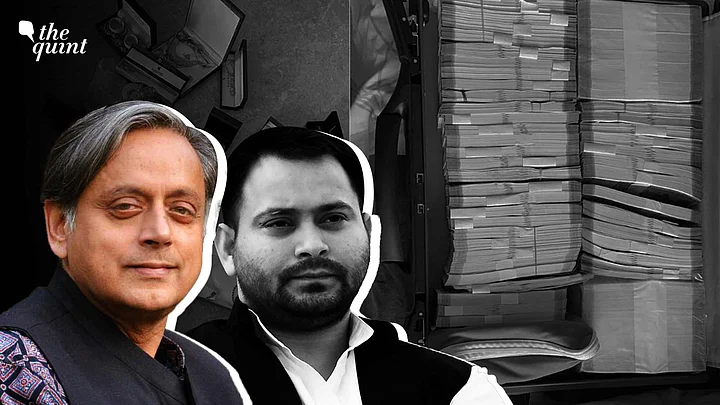The ongoing raid in the home of Bihar’s young RJD Chief Tejaswi Yadav, even while his wife battles a complicated pregnancy, is in many ways emblematic of the ruling party’s blatant misuse of law enforcement institutions in furtherance of its political agenda.
As general elections loom just a year away, the pace of persecution of notable Opposition figures seems likely to pick up. Even while Tejaswi was being raided, former MP Kavitha Kalvakuntla, daughter of Telangana Chief Minister and Bharat Rashtra Sena leader K Chandrasekhara Rao, was enduring nine hours of questioning by the Enforcement Directorate(ED) in Delhi.
ED Raids: An Opposition-Targeting Coup
Recent weeks have seen raids, questioning, and even arrests of notable leaders ranging from Karnataka Congress Chief DK Shivakumar to Delhi’s AAP Deputy Chief Minister Manish Sisodia.
It is no one’s case that wrongdoing should not be investigated and the guilty brought to book. The nationwide notoriety of politics and politicians as being mired in corruption—if for no other reason than to finance their political campaigns—must be ended by punishing the guilty in order to deter future crimes. If lawmakers become lawbreakers, they should of course be brought to book.
But there is a curious pattern to these raids that suggests no such virtuous objective behind the government’s actions. For one thing, the choice of targets is always, curiously enough, Opposition politicians. And the timing is always designed to bring maximum embarrassment and political inconvenience to them just ahead of elections.
Worse still, corrupt BJP politicians are always exempt from the attention of the central authorities. This is widely accepted as a political reality, not least by BJP leaders themselves.
Recently, the BJP’s Harshvardhan Patil had quipped that he was getting “sound sleep” in the saffron party as there were “no inquiries” conducted against him or his colleagues. Sanjay Patil, a BJP Lok Sabha member from Sangli in Maharashtra, last Sunday openly declared that the Enforcement Directorate (ED) will not come after him as he is a BJP MP.
Such remarks acknowledge the basic thrust of the government’s instrumentalisation of agencies tasked with investigating financial wrongdoing. Whether it is the now famous ED, the general Income Tax Department, or the shadowy Revenue Intelligence, investigative agencies routinely raid the premises of politicians to gain political benefits for the ruling party.
An Age-Old Yet Ruthless Political Tactic
Former Union Minister and NCP Chief Sharad Pawar openly alleged this week that central agencies, including the Central Bureau of Investigation, the Enforcement Directorate, and the Narcotics Control Bureau were being misused to target the opposition parties in Maharashtra and “defame” political opponents of the BJP government.
His comments barely raised an eyebrow, so widespread is the perception that he was merely stating the obvious.
Even businessmen who have supported or financed opposition parties have been raided. Prominent figures whose statements have been even indirectly critical of the policies and practices of the ruling party have found that even their families are not spared—witness the weeks of unjustified incarceration that Shah Rukh Khan’s son Aryan Khan was subjected to on the basis of a trumped-up NCB investigation.
In February 2017, Prime Minister Narendra Modi had issued a warning to the Congress during an election rally: “I have your entire janampatri”.
The dark allusion to his government’s ability to dig up the past was followed soon enough by actions. Sonia Gandhi and Rahul Gandhi were charged with their involvement in transactions relating to the National Herald newspaper.
Delhi minister and Aam Aadmi Party leader Satyendar Jain was arrested by the ED in a case connected to hawala transactions and is still in jail. Maharashtra’s former Home Minister Anil Deshmukh was an early victim, accused of helming an extortion racket. His cabinet colleague, NCP’s Nawab Malik boldly accused the central investigative agencies of “misusing power” in his state and was promptly arrested himself on allegations of money laundering.
Members of Parliament have not been spared: Tamil Nadu’s Karti Chidambaram and West Bengal’s Abhishek Banerjee have been repeatedly questioned on a variety of financial transactions.
BJP's Hitlist Continues To Expand Ahead of 2024
Since 2014, there has been a four-fold increase in ED cases against politicians. It is no surprise that under BJP's rule, 95% of the targets are from the Opposition.
Among the parties particularly in the crosshairs are the ones the BJP takes most seriously, with the Congress, the TMC and the NCP ranked as the top three in the ED’s net. With other Opposition parties rising, AAP and TRS (now BRS) are also ranking higher on the list.
Of BJP wrongdoers, there is no sign. As former Congress Leader Kapil Sibal pointed out at a rally yesterday: ‘Not one leader or minister in a BJP-ruled state or central govt has been targeted [by the agencies]. Not one.’
Political observers note that the process began to be perfected before the 2016 assembly elections, and was originally intended to stifle the flow of election funds to opposition parties to fuel their campaigns. Since then, raids against political leaders have become a regular election-eve exercise. As a curtain-raiser for the 2024 elections, we should all be alert for more such punitive raids.
Very few of them will result in legal prosecution, and fewer still in convictions. But building up a credible case that will hold up in court is the least of the agencies’ concerns. They are only interested in serving the purposes of the ruling party through the infliction of the greatest possible humiliation and reputational damage upon their opponents. The process is the punishment.
And the real crime? Daring to challenge the writ of the ruling party at the Centre. Every raid is one more nail in the studded coffin of our once-flourishing democracy.
(Dr Shashi Tharoor is a third-term MP for Thiruvananthapuram and award-winning author of 22 books, most recently ‘The Battle of Belonging’(Aleph). He tweets @ShashiTharoor. This is an opinion piece, and the views expressed are the author’s own. The Quint neither endorses nor is responsible for them.)
